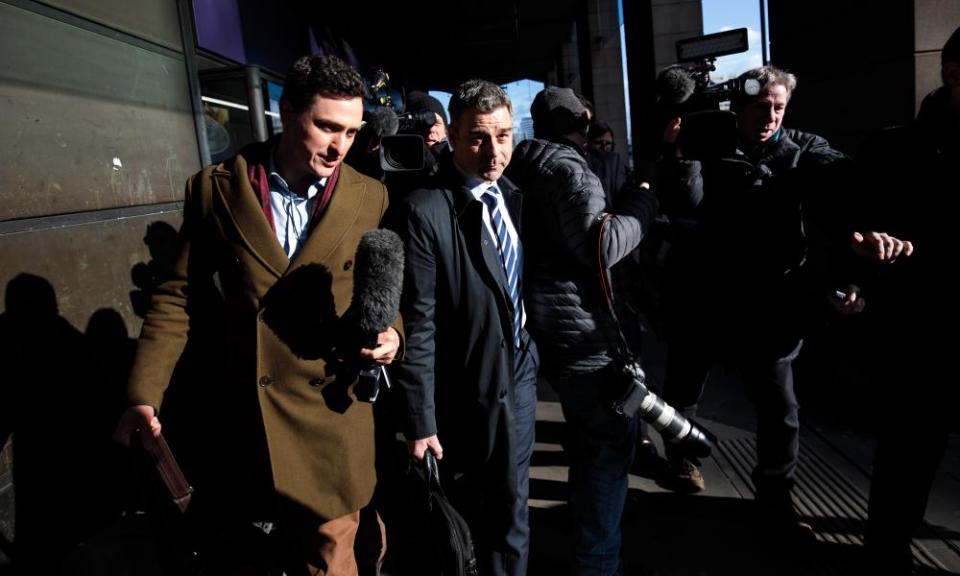Listening to Carillion's bosses, you're surprised it survived so long

It turns out we’ve all been asking the wrong question. There’s no great secret to why Carillion went bust. The only real mystery is what took the company so long when so many were hell-bent on running it into the ground.
First up in a marathon four-hour session before a joint meeting of the business and work and pensions select committees were the former interim chief executive, Keith Cochrane, who had been appointed after the profits warning in July last year, and the sacked finance officer, Zafar Khan. Neither of whom any sensible person would leave in charge of a tombola stall at a village fete, let alone one of the largest construction and services companies in the UK.
Cochrane was baffled. Before being promoted to chief executive, he had been a non-executive director of the company and appeared totally at a loss as to what had gone wrong. Yes, things had seemed a bit iffy at times, he admitted, but he had done his bit by raising a few concerns now and again.
So, did he think he might have challenged the board rather more robustly, inquired the joint chair Frank Field. Oh, no. That wasn’t the way these things worked at all. The whole point of a non-exec was to rock the boat as little as possible. That’s what he had got paid £60k for. Doing next to nothing. No one at his level gets out of bed for that sort of money.
“The business got itself into this position,” Cochrane continued. In his world, Carillion was a corporate superhero with cosmic powers of self determination. It had never once occurred to him that anything he or any of the other people in charge might have contributed to the company’s downfall.
Khan is an accountant who genuinely can’t count. “The company’s debt went down on my watch,” he said confidently. Er, no it didn’t, interrupted the co-chair, Rachel Reeves, who had the foresight to hold the balance sheet the right way up. “That’s what I said,” Khan continued seamlessly. “The debt did go up.”
The reason for the confusion soon became clear. Khan didn’t actually understand the meaning of the word debt. Or anything very much. Field wondered if the consistently high level of debt shouldn’t have bothered the board, as it may have been a prime contributor to Carillion’s weaknesses.
“What weaknesses?” Khan asked.
At this point, the committee had to break it to him that the company had been forced into liquidation last month. Khan appeared astonished to learn this. When he had last looked, the company had been in tip-top shape. Give or take a few hundred million.
The litany of incompetence went on and on. No, it had never occurred to either Cochrane or Khan that not getting paid on a contract for 18 months might generate cash flow problems. And it had seemed perfectly normal to prioritise shareholder dividends over pension deficits after issuing profit warnings. Dimness taken to new levels.
Things didn’t improve much when the former chief exec Richard Howson, chief finance officer, Richard Adam, chairman, Philip Green, and chair of remuneration committee, Alison Horner, gave evidence. They too, though naturally devastated for all the little people who had lost both money and jobs, were completely bewildered that Carillion had gone belly up. They all sought to shift the blame elsewhere and were adamant they would have given their lives for the company. Though not their cash.
Reeves asked Horner if she felt OK about having recommended massive pay rises and bonuses for members of the board when the company apparently resembled a giant Ponzi scheme, taking on unprofitable new contracts to pay for failing ones, for so long. “So …” said Horner. She began every sentence with a so.
So, it was like this. So, no one got a job on an executive remuneration committee by recommending bosses took pay cuts. So, it took people of unusual abilities to run a business so badly and they needed to be rewarded appropriately. So, yes she had been happy to sign off on anything that was put in front of her.
Field and Reeves closed in for the kill in a pincer movement. Did any of the Carillion bosses feel even the tiniest bit guilty about having raked in millions between them over the past few years? Talk to the hand. Would they consider repaying some of their bonuses as a gesture of remorse? Talk to the hand again. Nobody understood their pain. How they had suffered.
“Is there any last thing you would like to say to those who have lost their jobs while you are all right?” Field asked. There wasn’t. True to form, they just wanted to take the money and run.

 Yahoo Finance
Yahoo Finance 